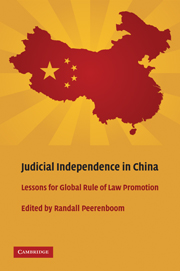Book contents
- Frontmatter
- Contents
- Contributors
- 1 Introduction
- 2 Halfway Home and a Long Way to Go
- 3 A New Approach for Promoting Judicial Independence
- 4 The Party and the Courts
- 5 Judicial Independence in China
- 6 A New Analytic Framework for Understanding and Promoting Judicial Independence in China
- 7 Judicial Independence and the Company Law in the Shanghai Courts
- 8 Local Courts in Western China
- 9 The Judiciary Pushes Back
- 10 Corruption in China's Courts
- 11 A Survey of Commercial Litigation in Shanghai Courts
- 12 Judicial Independence in Authoritarian Regimes
- 13 Judicial Independence in East Asia
- Index
12 - Judicial Independence in Authoritarian Regimes
Lessons from Continental Europe
Published online by Cambridge University Press: 05 June 2012
- Frontmatter
- Contents
- Contributors
- 1 Introduction
- 2 Halfway Home and a Long Way to Go
- 3 A New Approach for Promoting Judicial Independence
- 4 The Party and the Courts
- 5 Judicial Independence in China
- 6 A New Analytic Framework for Understanding and Promoting Judicial Independence in China
- 7 Judicial Independence and the Company Law in the Shanghai Courts
- 8 Local Courts in Western China
- 9 The Judiciary Pushes Back
- 10 Corruption in China's Courts
- 11 A Survey of Commercial Litigation in Shanghai Courts
- 12 Judicial Independence in Authoritarian Regimes
- 13 Judicial Independence in East Asia
- Index
Summary
Judicial independence is often considered the simple by-product of a set of legal provisions aimed at wholly insulating the judge not only from state influence – usually the executive – but from the external environment: the more insulated the judge, the more independent she is deemed to be. A good example of this attitude can be found in one of the 1985 United Nations Principles of Judicial Independence:
The judiciary shall decide matters before them impartially, on the basis of facts and in accordance with the law, without any restrictions, improper influences, inducements, pressures, threats or interferences, direct or indirect, from any quarter or for any reason. (Emphasis added.)
There is often little critical reflection about the extent to which this ideal can be realized in practice and its consequences for the administration of justice. Conversely, judges working in political systems where such guarantees are not present in full are thought to lack independence, often without any further investigation.
To clarify the issue, a distinction should be introduced between institutional independence – that is, institutional guarantees of independence like the well-known during good behavior clause against arbitrary dismissal – and independence on the bench, that is, impartial behavior on the part of the judge. Some degree of institutional independence is a necessary but not sufficient condition of judicial impartiality. Institutional independence is only one of several determinants of judicial behavior. This is one reason why it is not always easy to single out the “right” degree of (institutional) judicial independence.
- Type
- Chapter
- Information
- Judicial Independence in ChinaLessons for Global Rule of Law Promotion, pp. 234 - 246Publisher: Cambridge University PressPrint publication year: 2009
- 1
- Cited by



